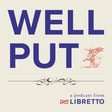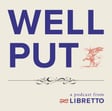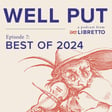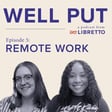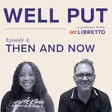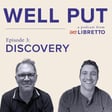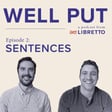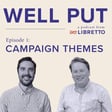Become a Creator today!Start creating today - Share your story with the world!
Start for free
00:00:00
00:00:01

Episode 6: Uncomplicating the Complicated
From poring over pages of interview notes to find the best ideas that will distinguish our clients to wrangling schedules across timezones, the Libretto team has to unravel plenty of thorny challenges on a daily basis. In this episode, Tiffany and Connor reflect on turning challenges into puzzles and drawing on our intellectual curiosity to keep things interesting.
Mentioned in this episode:
Game of Thrones (https://www.hbo.com/game-of-thrones)
King Gizzard and the Lizard Wizard (https://kinggizzardandthelizardwizard.com)
Hosted by Tiffany Carlson and Connor Ferguson
Produced by Madison Hunt
Edited by Connor Ferguson
Music by Coma-Media, via Pixabay
© 2024 Libretto. All rights reserved.
Recommended
Transcript
Introduction to 'Well Put' Podcast
00:00:13
Speaker
Welcome to Well Put, a podcast about communications for mission-driven organizations from libretto. I'm Tiffany Carlson, producer at Libretto. And I'm Conor Ferguson, senior creative lead at Libretto. Today, we're going to be talking about uncomplicating the complicated or maybe over-complicating the complicated hidden our work and sort of what skills we use to do that.
00:00:39
Speaker
um You know, I think that sometimes a lot of the ah a lot of what we do can can feel like it is kind of opaque even to us and and and some of the processes are um hard to kind of get a handle on.
Tiffany's Scheduling Challenges
00:00:54
Speaker
So we just wanted to talk a little bit about the ways in which we sort of make it fun for ourselves, ah find ah interesting solutions to the challenges that um that we have and um you know how that is potentially a rewarding experience hopefully a rewarding experience for most of us on a regular basis so tiffany when you think about some of the major challenges that you face on a daily basis how do you uh you know make it fun for yourself make it easier hopefully and just sort of tackle those tackle those challenges
00:01:29
Speaker
Yeah, so for me, the biggest challenge in my role as producer is often scheduling. And what I like to do is kind of almost turn it into a puzzle for myself. And um sounds kind of nerdy if you're not the one doing the scheduling all the time, but it really is just like, it really is just like a puzzle. I mean, you figure out what times work for our team and then you reach out to, you know, the client or you know, their contacts that we're speaking to for discovery and start to kind of piece it together.
00:02:01
Speaker
I like to kind of draw out, um, you know, a calendar or ah daily schedule, um and go from there. But really it's also kind of comes down to who you're dealing with.
00:02:17
Speaker
Um, Some people's schedules are easier to work with than others. I personally find the most challenging, but also the most fun to be, you know, people who have really busy schedules.
00:02:30
Speaker
And so it's extra rewarding when you can find one hour that aligns between two different calendars. It may take 10 emails or it may take a phone call, but, um you know, it's really good to be able to find a time and keep things going and not have to worry about, oh, am I slowing everything down? Because it's just, a you can find time for pretty much anything.
00:02:55
Speaker
And... Oh, but don't tell people that because then they think you're magic and that you can just make make time happen, and make time occur out of nowhere. That is the double-edged sword of it all, ah honestly.
00:03:09
Speaker
But, you know, it's, you know, my job. And I am, after two years at Libretto, have really found my stride in doing it and making it seem seamless to everybody else and making it feel more seamless to myself, too. Yeah.
00:03:29
Speaker
You know, I used to think I could just use the calendar, like just use my Google Calendar. It'll work out great. And it worked out fine. um But pen and paper, I'm kind of a traditionalist in that way. I do still use pen and paper for a lot of my work, including scheduling. So, yeah.
00:03:49
Speaker
That's cool. I didn't realize that you actually use pen and paper for for like scheduling and stuff, which is which is probably the one thing. I Calendars is probably the one thing that I don't use pen and paper for just because you know I get email invitations and things like that.
00:04:05
Speaker
but Yeah. yeah I mostly do it. It is sometimes just easier if you have to just draw something. like most Anything on the computer is just like it harder to do that than just picking up a pen.
00:04:18
Speaker
Yeah. Well, and part of why I use pen and paper is because, you know, I block off two to three hour chunks at a time, usually on libretto calendars, but I don't necessarily offer that whole chunk to an individual.
00:04:33
Speaker
So the pen and paper helps me keep track of which of these hours within this three hour chunk have I offered to somebody, what's still available, and it it keeps your calendars from getting too cluttered with information that only really I need.
00:04:49
Speaker
um So I keep more on the pen and paper ah and it just kind of comes together in Google Calendar. Yeah. so Is there anything, um i don't think I've ever asked you this, is there any like specific skills that you learned in your library science degree that actually help that aspect of it? like like i guess I guess this is maybe maybe more of a question of sort of like what are some of the skills that one learns in a library science degree? like Yeah.
00:05:19
Speaker
I imagine there's a certain degree of sort of like database management and like understanding how to like structure information. Because, you know, I think that like if I try to imagine doing some of the things that you do, it it it feels like the sort of thing where I would be kind of inventing it on the fly and just sort of like writing things down wherever wherever i can. But are there specific like techniques that you learned in your library science degree that apply to this?
00:05:47
Speaker
ah Well, spoiler alert, one of the things I learned from working in libraries is a lot of what you do, even if you have studied for it, is just on the fly.
00:05:58
Speaker
um ah okay. you get You get a lot of questions that like, ah like working in a library, you'd get a lot of research questions or just questions about your environment that you wouldn't even think might have been a question or a topic or something that you needed to worry about.
00:06:16
Speaker
And so I guess I would say from working in libraries, one of the big takeaways that has helped here is no amount of preparation will prepare you for everything that comes your way.
00:06:31
Speaker
There has to be a certain amount of being comfortable with something you don't know and or don't know the answer to and just being able to find it or figure it out.
00:06:43
Speaker
true um When I was explaining to my family ah what exactly I learned or do as a librarian, um a lot of it was just being able to search for answers for people to either find the answer on their behalf or teach them how to find the answer.
00:07:04
Speaker
um So it was really just kind of being prepared and being comfortable with not knowing an answer. So I would say what all of that has kind of helped me do at Libretto when I'm scheduling is kind of learn about the client and kind of their internal sort of schedules or processes and use that to inform how I approach scheduling everything.
Complexity in Communication Work
00:07:30
Speaker
We've had clients where everybody they've asked us to interview has had pretty flexible schedules. It's been really easy to you know, get on their calendar and others, you know, they've got conferences in the mix. They've got people in different countries or people in different states and time zones.
00:07:47
Speaker
And so, you know, learning a bit about them at the start kind of helps figure out how to approach it the best. And it's honestly never really the same twice.
00:07:59
Speaker
And that for me is part of the fun. um It's like a brand new reference question. that That underlines the the the aspect of your work that like it is, even though even though it's it's sort of a you know, somewhat of a a a of a sort of like mechanical process in the sense of like it's it's it's slotting people into a certain points of the schedule.
00:08:26
Speaker
There is a human element to it. It's not just about kind of like I guess what I'm getting at is is sort of like you're you you you can't be just replaced by an AI.
00:08:37
Speaker
Right. there's There's more to it than that. There's more to it than just filling spots on the schedule. Yeah, absolutely. Definitely. um But I'm curious, you know, so as producer, I do a lot of the the scheduling, of more of the logistics side of things.
00:08:55
Speaker
um But in terms of like your work as, you know, writing, strategy support, all of that, What do you find the most challenging about what you do?
00:09:07
Speaker
I think that's changed over the years, um you know, because I've i've been at Libretto for over 10 years at this point. um I think that one of when I first started, one of the things that I found the most challenging was preparing findings documents.
00:09:26
Speaker
So going through all of the notes from our discovery sessions where we had interviewed stakeholders related to the ah project and and and distilling that down into something that we could share with the immediate client team to um get across the key themes of what we heard and observed.
00:09:46
Speaker
And I think that you know it it took me a while to kind of figure out what the um what the process of doing that should be, because it's sort of like if you just have a bunch of like raw notes, raw information, how do you how do you pull out the stuff that is going to be most important there?
00:10:05
Speaker
And part of that just literally took was had just do more projects and spend more time doing this work to get a sense of, you know, the kinds of things that are important and the kinds of ideas that that that stand out.
00:10:22
Speaker
um And as much as every client and every project is very different, to a certain extent, some of the same sorts of things are going to be important no matter what project you're talking about, no matter what client you you're working with. So From that standpoint, it got easier just over time.
00:10:38
Speaker
But then also, it just sort of I had to kind of learn um like literally a a process for myself of, like okay, we'll go through all the notes and just start underlining the ideas that seem interesting to you, you know and then maybe put those on a list separately. And then, okay, if you look at that list of those of those points and those ideas that have been made,
00:11:01
Speaker
Like, what does that tell you? What does it does that start to paint a picture? Can you group these these ideas? You know, then you start to say like, oh, OK, well, several people said something related to this.
00:11:13
Speaker
So, um you know, I've got three ideas related to the nature of i don't know the community of the of the school or something like that. Um, and, uh, and, and can I, can I come up with a statement or an idea that seems to summarize what a lot of these people were getting at? Or is there, uh, is, is there some sort of dissonance or conflict between what these various different stakeholders said?
00:11:44
Speaker
So that was initially, I think one of the most challenging things for me. And now I think it's, it's a lot, um, It's a lot easier because i sort of recognize I under have a better sense of where we're going and like what it what it what purpose these findings serve.
00:12:01
Speaker
um And then i guess now what what would be some of the most challenging things is Um, messaging is a, is it is a, is an interesting challenge because it's sort of like, if you're creating a messaging platform, particularly for an entire institution or an organization, you're trying to create a toolkit, a guide that, um, contains language and ideas that can be used to describe any aspect of their offering.
00:12:29
Speaker
And so just figuring out like, all right, what's, but what's the hierarchy here? Like how many, how many messages are we talking about? which mess which things need their own message which things need their own um bit of bit of language associated with them uh so you know i guess it it just sort of like cutting things down to size like and i guess that that in some ways is kind of ah a theme of a lot of what we do and it seems to be kind of similar to to what you do is it's sort of like there's this just big behemoth of unsorted information
00:13:05
Speaker
you know, dates, quotes, ah you know, any any sort of information and how do we sort of tame that beast? How do we oh cut it down to size? And some of that is is like, you know, it's a sorting the wheat from the chaff thing. It's like, yeah, you can have ah a huge conversation and you write down a lot of things that happen during the conversation.
00:13:27
Speaker
But, you know, probably 50% of those things are not actually like hugely relevant to the work at hand. Sure. I'm also curious. So at Libretto, a lot of our project teams are more than one person for the most part. We try to do that.
00:13:41
Speaker
How would you say that working with other people um kind of helps work through some of these challenges? Or what what does that partnership look like when you're dealing with these challenges?
00:13:53
Speaker
Well, think that sometimes it's... a Sometimes it can be a little strange because I think we all have very different working styles. And I think in some ways we have different ways of sort of managing, like I was talking about that, that sort of like behemoth and cutting it down to size and managing the, um the, the challenge of it. For me personally, it's like, if I have you know, a lot of a big writing project, I have to write and a whole messaging platform or something like that.
00:14:22
Speaker
The way that I tend to psych myself out for it is i I sort of figure out how to cut it down to size in my brain and like tell myself that it's not as bad as not scary as I think it is. And so it's like, all right, well, I just have to do this thing and then this thing and this thing. And that's going to only be like a page. So like, just do that, that, that, and then it's done.
00:14:41
Speaker
You know, and I think that there are some other folks on the team. I think Neil is is one who's like prefers to like really ah like he gets psyched up by looking at the um the sort of the complexity of it and the enormity of it. And it's sort of like, OK, this is this is this is a this is a big undertaking. There's it's it's going to take some doing, as he sometimes says. Yeah.
00:15:04
Speaker
And so, you know, that that's sometimes the um the challenge of. Mm hmm. or not the challenge. Actually, I would say the um that what what makes working in a team like that good is that you can have different approaches to to the work and different approaches to sort of how you mentally conceive of the work.
00:15:24
Speaker
So another thing that I've been curious about is um you you've been here for about 10 years now, and a lot of projects have rolled through with similar themes, whether they're you know, a campaign messaging, institutional messaging.
00:15:38
Speaker
How do you kind of, how do things stay interesting? Is it just, you know, different clients along the way? Is it different approaches? Like what makes it interesting?
00:15:50
Speaker
And is is keeping it interesting a challenge or does it come naturally? um I mean, i would say that... No, I don't think that keeping it interesting is a challenge. I mean, i try to approach most of this work with a sense of intellectual curiosity. So it's...
00:16:06
Speaker
um have Every client, if if if a client seems like it's too similar to other projects that we've done in the past, then sort of the the challenge for myself is, well, find the way that it's different and dig into that from a sense of just like intellectual curiosity. I'm...
00:16:32
Speaker
I'm somebody who like, I spend a lot of time just learning things just, you know, for myself and in yeah in my personal life. And, you know, it's like I i and sit around and study ancient Greek and and stuff like that. And, you know, so intellectual curiosity is it is ah is a big thing for me. i I like learning new things. I like...
00:16:55
Speaker
um You know, I mean, you were talking about how how you treat scheduling like a puzzle. Like, I like that puzzle-like aspect of it. And so if you find something that seems like it might be hard for it to be interesting because it's too similar to something that you've done, you know, 10 other times the The challenge is like, well, like ah guarantee it's not the same as as the thing you've done 10 other times.
00:17:24
Speaker
And how do you find the what is what is distinct about this client, this engagement? um And sometimes it's the people, sometimes the, the, just the people that you're working with can, you know, the the immediate client team can really be inspiring in how they approach their work. I mean, um you know, ah Adrian and I were, were just at a discovery session um ah on, on campus at a law school a couple of weeks ago.
00:17:55
Speaker
And, you know, one of the things that was so fun about that was actually that the their team, like that immediate client team, they had also all worked there for like 10 plus years. And so they were so like in sync with each other and had such a deep understanding of the place. And so it made it...
00:18:15
Speaker
um it was It was just interesting to sort of get an insight into their dynamic. um So sometimes it's not even that the thing that is the that that is the nugget that in ignites your intellectual curiosity isn't necessarily even the work itself. Sometimes it's the people that you're working with.
00:18:34
Speaker
um and And that's what makes what makes it interesting. So yeah, it's it's always, um its it's never it's never the same, even if on the surface you think it is the
Personal Interests Outside of Work
00:18:45
Speaker
same. And the challenge is to dig a little deeper and find what makes distinct and different.
00:19:02
Speaker
All right. So, Tiffany, what are you loving these days? What what is what is on your mind at the moment? Yeah. so these days, um I've actually been rewatching a TV show that I last watched when it was airing on TV, which is Game of Thrones. I've been rewatching with my husband.
00:19:23
Speaker
um And it's been really interesting. We're in season six right now. I'm putting off this big battle episode. I don't like battle scenes, but I like the rest of the show ah personally.
00:19:37
Speaker
um But no, it's been really interesting because my husband has read the books, but he's never seen the show. And I've seen the show and I've never read the books. So at least for the first, what is it, four or five seasons, it's been really interesting because he's been able to say, well, in the books, it was actually this way or in the books, this is what happened. Like, I think one example he gave was like Tyrion in a battle was supposed to like lose his nose or something. yeah yeah He just kind of has this kind of like little scar now and it didn't really maim him much at all. And um so it's really interesting to kind of hear
00:20:18
Speaker
where it departed from the books and where it kind of stayed true. And i mean, also kind of makes me want to read the books now to kind of get more details. I i was always ah afraid to read,
00:20:34
Speaker
maybe not afraid, intimidated by the books because I worked at a public library while the shows were airing. And so when all the books would come up through on hold, I would kind of flip through them and like, what is this about? What's all the hype about?
00:20:47
Speaker
And I couldn't pronounce some of the names. And yeah I was just like, I don't know if I can go through like a five book series and not know how these names are pronounced.
00:20:59
Speaker
Um, so now that I know, um He did have kind of a a thing about using relatively normal names and just spelling them ridiculously.
00:21:12
Speaker
Yeah. Like Marjorie is one that stands out to me. Something about the way he spelled Marjorie just kind of rubs me the wrong way. Yeah. A lot of vowels.
00:21:25
Speaker
Too many vowels. It's sort of the classic fantasy literature thing of just like add some more vowels and put two vowels next to each other and and yeah make it make it look make it look similar. it is it It's it's a pet of mine for in In like fantasy literature or fantasy or sci-fi stuff where it's it's sort of like the um the names are clearly just like there's there's no sort of like linguistic backing to it. You know, it's not like it's not like Tolkien where it's sort of like, okay, well, but but all of these names are actually from like actual languages that he created. And so they actually...
00:22:02
Speaker
Not necessarily that they mean something, but that the phonology is is yeah consistent and it makes sense and it's there's a reason why um why letters exist where they do.
00:22:14
Speaker
Yes. yes Well, now you're in for the real downhill slog as oh yeah as the show gets progressively worse. Yeah, I am very much looking forward to my husband's reaction to a bunch of them because he he's been spoiled on a little bit of what happens, but not all of it.
00:22:34
Speaker
And just based off of like the characters he seems the most interested in, i think he's kind of in for a shock. And yes I'm very much looking forward to observing that. so Who are the characters that he's most interested in? feel like at this point, we don't really have to give a spoiler warning. No, I don't think we do. Because it's just kind of like, yeah.
00:22:52
Speaker
I mean, he's he's always been the most interested in like the Jon Snow and the... I just blanked on what they're called. the The Night's Watch.
00:23:05
Speaker
Night's Watch, yeah. he's He's always been kind of more interested in the storylines related to Jon Snow and the Night's Watch. And Jon Snow just came back to life.
00:23:17
Speaker
right And I don't think he knows exactly what's in store for Jon Snow in the next couple of seasons. So i that'll that'll be fun to watch. He also...
00:23:29
Speaker
has been complaining about how much they're trying to make jamie lannister and brienne of tarth seem romantically interested in each other at all um which does happen spoiler alert um so there are a couple things that i think he's gonna shake his head at like yeah but we'll see ah it's always been fun to rewatch Yeah, it's it's always remarkable to me thinking about how just seminal that show was in pop culture for like seven, eight years, however many years it was on.
00:24:06
Speaker
And then like, like it was it was in everything. i mean, I remember Adrian and I went to South by Southwest Interactive 2016 and they had... a like immersive Game of Thrones experience. I mean, you know, it just like branded, branded experience, but where they had the Iron Throne and you could like go and sit in the Iron Throne and get photo ops and stuff. So we both have photos of of ourselves sitting in the Iron Throne and stuff like that. And it was just everywhere and everybody was talking about it. And it's, you know, it's a crossover hit and and stuff like that.
00:24:42
Speaker
And it's just remarkable how even with all of that, A ah terrible ending could just kill that. I mean, like overnight, everybody just stopped talking about it.
00:24:57
Speaker
Yep. And i don't know, maybe I guess, so you know, people are still paying attention to House of the Dragon, but im i I haven't watched that. I have not watched it either, but, um we are physical media fans. So we have all the the shows on Blu-ray and actually when we were shopping around, um, we've, we've been getting them secondhand mostly. And when we were shopping around one of the shops we were at actually had season one of year of the dragon or house of the dragon. Sorry.
00:25:27
Speaker
um And so we got it and we're going to watch it after season eight. um I don't know what to expect. I have far less of an online presence than I did in, you know, even two years ago. So right I don't really know what to expect of the new one, but I'm excited to give it a try.
00:25:48
Speaker
I honestly had no idea that they still released Blu-rays of TV shows. Yes. Yep. They do of most of them. we We also collect a bunch of the Star Trek TV shows that Paramount has been making too. So physical media is still out there.
00:26:04
Speaker
Yeah, I mean, i don't have, I don't think I even have anything that could play a disc. we We have a video game console. We've got a PS5 and that'll play Blu-rays. Ah, yes, that's true.
00:26:17
Speaker
Yeah. yeah That's true. Okay. But I've gone on about Game of Thrones, but Connor, what are you loving lately? um So I have been into this band called King Gizzard and the Wizard Wizard.
00:26:33
Speaker
um So it was it it was a very – don't know why I got got into this. But basically, so we had a friend who was – visiting from out of town and um that this band was playing ah in Chicago. And so we we went, he really wanted to see King Gizzard and the Lizard Wizard. I'm just going to keep saying the name of the band over and over again, because it's the most ridiculous band name I've ever heard.
00:27:00
Speaker
um That's not true. But...
00:27:04
Speaker
so they are i mean i guess prog rock is kind of the best like shorthand way to describe it um they're an australian band they've been around for like i want to say like 12 or 13 years and i think in that time they've produced like 24 or 25 albums oh my gosh like some years they they've they released like three or four albums um they just they churn out music um So they've got like a prog rock jam band kind of vibe with a little bit of a you know touching into kind of like some metal aspects of things. I mean, I think that like obviously prog kind of mashes up or or in some ways borrows from a lot of different genres.
00:27:49
Speaker
um But they're just they're very... They're very high energy. Their concerts tend to be incredibly long. So this was like the experience of, you know, I had barely ever heard this band and I was invited to this concert and it's like, oh yeah, no, the concert is probably going to be three hours, three and a half hours.
00:28:08
Speaker
um We didn't actually stay for the whole thing because we literally just flown back from Los Angeles the day before. So, um but yeah, It was, i think, what what kind of inspired me to dig a little deeper into their catalog and actually spend more time even after the concert listening to them is just seeing the the devotion of this fan base and how, like...
00:28:33
Speaker
into it everybody was um and uh and i've gotten into it i mean like they have so one of their albums which is like often talked about as one of their best is called nonagon infinity and it is an infinite loop so like that the the the album every song like just transitions into the next one and then when you get to the end you realize it just loops right back to the to the start.
00:28:57
Speaker
um Spotify can't really do that very well when it goes back to the start. It still like has a little hiccup, but I wish there were a way to truly actually infinite loop it. If it if you if you could... make sure that there was no gap between the end of the last track and the beginning of the first track it would go infinitely but um they have this whole like shared universe with all of their a lot of their songs that involve these sort of like kind of lovecraftian lizard gods and and stuff like that i don't know um but they're they have this like
00:29:30
Speaker
major sort of environmentalist streak with some of the lyrics and and things like that. I don't know. um Wow. It's not the kind of thing that I would have thought that I would get into, but it's I will say what it is good for is it's really good workout music.
00:29:49
Speaker
Like... Oh, all right. Because it's get like, because it's, it's, it's high energy. Yeah, high energy driving the the whole thing. Okay. So, yeah, it's, it's really good workout music.
00:30:02
Speaker
Good to know. You know, funny enough, I have heard of them, but I couldn't tell you how or why. But I've heard that name before, that band name, because it's pretty remarkable. It's distinctive. Very distinctive.
00:30:16
Speaker
um I feel like if I tried to say it, I'd get tongue-tied, but, you know. Yes, yeah. There were a number of people at the show, like, that dressed in costumes, and I would say that the costumes varied widely. Some of them were sort of like...
00:30:33
Speaker
like steampunk pilots and then some people like literally were wearing like hats that were like alligator heads and stuff like that but or you know yeah um so i just don't interesting yeah i don't know um and it was at this like huge outdoor venue in chicago so it was um there were thousands of people there Wow.
00:30:57
Speaker
Yeah. I wonder what the passersby thought of the array of costumes gathered together. Yes. Yeah. It was certainly interesting. I have i have a suspicion also that that there was an abundance of various substances that get consumed at there at their shows.
00:31:19
Speaker
Yes. with With the exception of some beers that did not pertain to.
00:31:25
Speaker
yeah but yeah i mean interesting that sounds i'm gonna have to check them out because high energy i do like workout music i do need sometimes and you know i gotta now i want to figure out why i've heard of them honestly yeah i mean because because the thing is is that also like they're they there's definitely a a big shift from album to album too, in terms of style and, and things like that. So it's almost like, and like also from a like music nerd standpoint, like a lot of their stuff, they, they do some, they play around with time signatures a lot. So it's like, Oh, I love that. All being in four, four, like, like a lot of the songs in nonagon infinity are in like five, four, seven, four and stuff like that.
00:32:08
Speaker
Um, love and, um, And then they have at least, I think it was a series of three albums that actually experimented with microtonality. So like, oh you know, breaking the breaking this the scale up into more than just the traditional 12 chromatic notes.
00:32:24
Speaker
um So, you know, that's that that's kind of fun and and and and weird. But it's almost like if you listen to one album of theirs and you're sort of like, and don't know if this is for me, like just try another one and it might be totally different. And you'd be like, oh yeah, actually really like this.
00:32:40
Speaker
Interesting. interesting Huh. I'll have to check them out. Yeah. It's, you know, don't but yeah, they're, they're good. It's good workout music. Good. All right. Well, ah this has been well
Conclusion and Call to Action
00:32:54
Speaker
put. It's been fun talking about challenges and yeah complexities and ah puzzles and ah good, but then terrible TV shows and lizard prog rock with you.
00:33:11
Speaker
It's been fun. Thanks, Connor. And if you all listening want to learn more about libretto and what we do, check out libretto-inc.com. That's libretto-inc.com.
00:33:24
Speaker
Well put.
